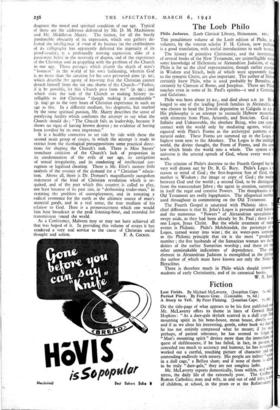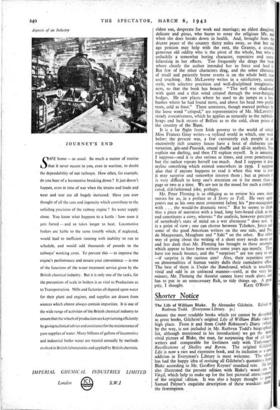Fiction
ON the title-page of what appears to be his first published Mr. McLaverty offers its theme in lines of Gerard Hopkins: " As a dare-gale skylark scanted in a .dull cage mounting spirit in his, bone-house, mean house, dwells and if as we close his interesting, gentle, sober book we feel he has not entirely compassed what he meant; if by perhaps, of patient tolerance, he has seemed to forget " Man's mounting spirit " desires more than the immediate quest of shiftlessness; if he has failed, in fact, in passion, conceded too much to accuracy and humour, he has neverth worked out a careful, touching picture of character and contending endlessly with misery. His people are indeed " in a dull cage," a Belfast slum; and if none of them is all to be truly " dare-gale," they are not songless larks.
Mr. McLaverty reports domestically, from within, and wt stress, the daily life of the extremely poor. The Griffins Roman Catholics; man and wife, in and out of odd jobs; a of children, at school, in the pram or at the Reformatorh
eldest son, desperate for work and marriage; an eldest daughter, delicate and .pious, who burns to essay the religious life, and when she does breaks down in health. And, brought from the decent peace of the country thirty miles away, so that her old age pension may help with the rent, the Granny, a cranky, generous old oddity who is the pivot of the whole, but who is unluckily a somewhat boring character, repetitive and unet. hilarating in her effects. Too frequently she drags the book where clearly the authok intended her to force and lead it But few of the other characters drag, and the sober chronicle of small and patiently borne events is on the whole both true and touching. Mr. McLaverty writes in a satisfactory, careful style, with selective precision and well-disciplined, imaginative. ness, so that the book has beauty. " The well was shadowed' with quiet and a thin wind crisped through the over-hanging hedges. He saw places where he used to do jumps as a boy, bushes where he had found nests, and above his head two poplar trees, cold as frost." These sentences, though marred perhaps by the loose word " crisped," are representative of Mr. McLaverty's steady evocativeness, which he applies as naturally to the rubbish- heaps and back streets of Belfast as to the cold, clean peace of the country of the Bann.
It is a far flight from Irish poverty to the world of which Miss Frances Gray writes—a stylised world in which, one week before the present war, a few excessively rich people in an excessively rich country house have a bout of elaborate con- versation, gin-and-Peacock, sexual shuffle and all-in analysis. You explain me darling, and then I'll explain myself. It is amusing, I suppose—and it is also serious at times, and even penetrating., but the author repeats herself too much. And I suppose it does stylise something which existed somewhere in 1939. I suppose also that if anyone happens to read it when this war is over it may surprise and somewhat interest them ; but at present it is very difficult to keep one's attention on it for more than a page or two at a time. We are not in the mood for such a compli- cated, old-fa-Shioned joke, perhaps.
Mr. Peter Fleming is so obliging as to review his own short
stories for us, in a preface to A Story to Tell. He very aptly points out as his own most consistent failing his " pre-occupation
with . . . the would-be dramatic twist." But he seems to think
that a piece of narrative with a loud, lone fore-heard click at the end constitutes a story, whereas " the analysis, however percipient, of somebody's state of mind on a wet afternoon " does not. It is a point of view ; one can choose between Tchekov, Joyce and some of the good American writers on the one side, and Poe, de Maupassant, Maugham and " Saki " on the other. But either way of going about the writing of a short story needs more art and less dash than .Mr. Fleming has brought to these attempts, which appear to have been written some years ago mostly. The! have too much bounce, and the " surprises " are too easy to see —if surprise is the curious aim? Also, their repetitive stress on abnormalities of human vanity dulls their cumulative effect The best of them is -Under the Bandstand, which is touching, vivid and odd in an unforced manner—until, at the very last minute, Mr. Fleming the theorist cannot leave truth alone, and has to put in an unnecessary flick, to tidy things up. A great



























 Previous page
Previous page